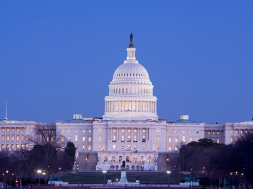
Washington News Brief
By Sharon H. Bob, Ph.D., Higher Education Specialist, Powers Pyles Sutter and Verville, PC
House Appropriations Committee passes FY 2018 Labor, Health and Human Services, Education, and Related Agencies Appropriations Act
On July 19, 2017, the House Appropriations Committee passed the FY 2018 Labor, Health and Human Services, Education, and Related Agencies Appropriations Act, by a vote of 28-22. The bill includes $66 billion for the Department of Education, which is $2.4 billion below the FY 2017 level. The bill would allow the maximum Pell Grant award to remain at $5,920 for the 2018-2019 school year. The House GOP appropriators pushed back on proposed education cuts included in the Trump FY 2018 budget proposals, rejecting its proposals to cut Federal Work-Study by 50 percent and eliminate the Federal Supplemental Educational Opportunity Grant (FSEOG) program. Both programs would be funded at their current year level under the House bill.
The Republicans voted down several Democratic amendments that would have reversed various cuts to education programs. The Committee also rejected an effort by Democrats to insert a rider forcing the Department of Education to enforce the Obama Administration’s Title IX guidance for how colleges should handle sexual assault cases. David Young (R-IA) withdrew his amendment that would have expressed concerns with Secretary DeVos’ plans to hire a single company to service federal student loans when the Committee leadership committed to work with the Senate appropriators on this issue. The bill next goes to the House floor for consideration.
House Budget Committee passes its FY 2018 Budget Resolution
On July 19, 2017, the House Budget Committee approved its FY 2018 Budget Resolution, titled, “Building a Better America,” by a vote of 22-14. A budget resolution is a blueprint containing broad tax and spending policies for the next fiscal year. The FY 2018 Budget Resolution allocates $621.5 billion for defense spending and $511 billion for nondefense discretionary spending, but calls for an expedited “reconciliation package” to enact comprehensive tax reform and cut $203 billion from mandatory spending programs, such as student loans. During the 12-hour committee markup, Democrats offered 28 amendments to strike many aspects of the FY 2018 Budget Resolution, but all of the proposals were defeated largely along party lines. Included in the FY 2018 Budget Resolution was language related to higher education:
“The Federal Government has directly supported students and provided institutional aid for decades, yet several disconcerting trends have emerged:
- Rising college costs: College tuition is increasing well beyond inflation. After accounting for inflation, published tuition and fees at public four-year schools are 3.1 times higher in 2016-17 academic year than in 1986-87; 2.29 times higher at private four-year schools; and 2.43 times higher at public two-year schools.
- Unsustainable student debt: There is widespread concern that students are borrowing money they do not need and may have trouble repaying. Research shows defaults come most frequently from those who borrow less than $5,000 and those who do not complete a degree. The Federal Government holds most student loan debt; as of the first quarter of 2017, its portfolio was $1.29 trillion, up from roughly $516 billion in fiscal year 2007. As Federal lending consumes an ever-larger share of the student loan market, it crowds out private and other lenders that may have better products to meet borrowers’ needs.
- Complex, overlapping federal aid programs: Students and parents navigate a confusing array of grants, loans, loan repayment, and loan forgiveness options when trying to decide how to pay for college.
- Strengthen career and technical education and reform workforce development programs: A February 2017 Bureau of Labor Statistics report found that 7.5 million Americans are unemployed. Yet the Bureau also reports 5.6 million job openings. This gap is due in part to the failure of the Nation’s workforce development programs to match workers’ skills with employers’ needs. This budget recognizes Congress has the opportunity to ensure federal laws governing CTE programs empower State and local leaders to design ways to educate students for high-demand, high-skill jobs. It builds on the reforms in the Workforce Innovation and Opportunity Act [WIOA], signed into law in 2014. It calls for consolidation of duplicative Federal job training programs and improved coordination with the reformed workforce development system. A streamlined approach will reduce administrative costs and equip workers and job seekers to respond quickly to career challenges.
- Simplify and streamline higher education programs and financing to protect students and taxpayers: The current Federal aid system is complicated and time-consuming for students and parents trying to make higher education financing decisions. In addition to Federal grant aid, six loans, nine loan repayment plans, eight loan forgiveness programs, and 32 options for loan deferment and forbearance exist. Each program has different eligibility criteria and terms. The budget envisions a simplified, transparent, and fiscally sustainable aid system. Principles for reform include more transparency for loans and repayment plans, removing perverse incentives to over-borrow, consolidating the array of programs, and protecting taxpayers.
- Account for the true costs of student loans: By statute, the government’s accounting procedures for assessing the costs of student loan programs do not incorporate market risk. For example, borrowers may have trouble finding a job and repaying loans in an economic downturn. To measure student loan program costs, the budget recommends using fair-value accounting, which does assume such market risk.
- Make the Pell Grant program sustainable: The Pell Grant program, which offers low-income students portable grants to pay for college, is the foundation of federal student aid. Congress and previous administrations made repeated decisions to raise the program’s maximum award and expand eligibility, and the program is now on shaky financial ground. Between fiscal years 2006 and 2016, The Pell Grant program’s discretionary costs ballooned from $12.8 billion to $22.2 billion. The comprehensive fiscal year 2017 appropriations act reinstated year-round Pell Grants, which aim to help students take summer courses and graduate more quickly. Future reforms should ensure Pell Grants go to students with the most need, that students complete school in a timely manner, and that this program is financially sustainable and available for future students.
- Encourage innovation: Higher-education policy reforms should also maximize innovation and foster an environment in which students and their families can choose from a variety of institutional options. Such policies could include reexamining the data made available to students, as they make decisions about where to go to college and how to pay for it. Additionally, the Federal Government can review the accreditation process and any regulatory barriers in higher education that restrict innovative teaching models such as online programs.”
Senate Veteran’s Affairs Committee passes legislation to expand GI Bill; House passes companion bill
On July 26, 2017, by unanimous vote, the Senate Veterans’ Affairs Committee passed S. 1598, the Harry W. Comery Veterans Education Assistance Act, which was sponsored by Johnny Isakson (R-GA) and Ranking Member Jon Tester (D-T). S. 1598 would modernize and strengthen veterans’ education benefits. The Senate bill is identical to H.R. 3218, which passed the House on July 24, 2017 by a vote of 405 to 0. The bill includes a range of benefits that veterans’ groups have long sought, such as eliminating the 15-year time limit to use the GI Bill benefits, and would restore the GI Bill educational benefits of student veterans who were affected by the closures of Corinthian Colleges and ITT Tech.
A copy of the Senate summary is found at: https://www.veterans.senate.gov/imo/media/doc/07-17-17%20Final%20SVAC%20GI%20Bill%20One%20Pager.pdf
A copy of the text of H.R. 3218 is found at: https://www.congress.gov/bill/115th-congress/house-bill/3218/text?q=%7B%22search%22%3A%5B%22H.R.+3218%22%5D%7D&r=1
House and Senate Democrats question the legality of delaying the borrower defense to repayment rule
On June 29, 2017, 48 House and Senate Democrats sent a letter to Secretary of Education Betsy DeVos expressing opposition to the Department of Education’s recent decision to delay the borrower defense to repayment rule. They questioned the ability of the Department to invoke the Administrative Procedure Act (APA) to delay the effective date of the rule. “The Department has never before used a justification under 5 U.S.C. Section 705 to delay the implementation of a pending regulation due to litigation. To do so now in order to delay consumer protections for student borrowers and safeguards for taxpayers is both highly unusual and legally suspect.” The letter also questions the Department’s notice delaying the effective date for institutions to modify their contracts to ban arbitration and noted that institutions have had eight months to prepare for implementation and many “responsible institutions would have already done the work to come into compliance with this provision, as it was set to go into effect less than a month before the delay was announced.” Finally, the letter questioned the Department’s assertion that the delay of the borrower defense to repayment rule will avoid significant costs to the federal government and taxpayers.
A copy of the letter is found at: https://www.help.senate.gov/imo/media/doc/062917%20DeVos%20BD%20Delay%20Letter.pdf
House Democrats urge ED to reconsider the delay of the GE and BDR rules
On June 22, 2017, Mark Takano (D-CA), Raúl M. Grijalva (D-AZ), Suzanne Bonamici (D-OR), Jared Polis (C-CO), and Carol Shea-Porter (D-NH) from the House Education and the Workforce Committee wrote to Secretary of Education Betsy DeVos urging her to reconsider the delay of the gainful employment and the borrower defense to repayment rules. The decision to delay and revisit the rules suggests that the rules may be weakened or repealed. “A delay or attack on these two safeguards could leave taxpayers and students on the hook when schools commit abuses or suddenly shut their doors; impede justice for defrauded students; and make more opaque career education programs that impose long-term financial hardships for graduates.”
White House issues Unified Agenda of Regulatory and Deregulatory Agenda
On July 21, 2017, the White House released its Unified Agenda of Regulatory and Deregulatory Actions for spring 2017. The Unified Agenda is required by the Regulatory Flexibility Act of 1980, which mandates that federal agencies publish in April and October a regulatory agenda describing “economically significant” events in order to encourage greater public participation in the regulatory process. In addition, the publication also carries out Executive Order 12866, which requires federal agencies to publish a regulatory agenda every six months. In a departure from past practice, this year’s agenda describes the Trump Administration’s deregulatory efforts including an announcement that federal agencies will be withdrawing 469 regulations proposed in the Obama Administration’s final regulatory agenda in 2016 and will be reconsidering 391 active actions. Further, federal agencies delayed 282 regulations going through the rulemaking process and halted rulemaking for another 109 regulations.
OMB Director Mick Mulvaney said that he was declaring a “war on waste” and reinforced President Trump’s pledge to slash regulations. According to the spring agenda, the Office of Postsecondary Education has the following regulatory priorities:
- Borrower defense to repayment: An interim final rule in June 2017 delayed the BDR rule for one year. The Department also plans to issue a proposed rule delaying the effective date until July 1, 2019. The rule will be released in August 2017.
- Negotiated rulemaking under Title IV of the HEA: The Department announced its intent to establish one or more negotiated rulemaking committees to prepare proposed rules for Federal student aid programs including borrower defense to repayment, gainful employment, and potential regulations to govern guaranty agencies.
A copy of the Department’s Office of Postsecondary Education agenda is found at: https://www.reginfo.gov/public/do/eAgendaMain?operation=OPERATION_GET_AGENCY_RULE_LIST¤tPub=true&agencyCode=&showStage=active&agencyCd=1800
Department of Education has not approved any borrower defense claims since Jan. 20, 2017
In a July 7, 2017, response to an inquiry from Senators Dick Durbin (D-IL), Patty Murray (D-WA), Chuck Schumer (D-NY) and Elizabeth Warren (D-MA) of May 17, 2017, James Manning, Acting Under Secretary, said that no borrower defense applications have been approved since Jan. 20, 2017. Since Jan. 20, 2017, the Department has received 14,949 borrower defense claims from students who attended Corinthian, ITT and other institutions. Acting Under Secretary Manning also said that a total of 65,169 claims are currently under review, decision, or adjudication, and the majority of the claims are from students who had attended Corinthian (45,092). Students who had attended ITT comprise 7,186 of the claims.
A copy of Acting Under Secretary’s letter is found at: https://www.durbin.senate.gov/imo/media/doc/17-010570%20Durbin%20Outgoing.pdf
Advocacy groups and institutions ask congress to extend Pell Grant increases
On July 25, 2017, over 300 advocacy groups and postsecondary institutions sent a letter to House and Senate leadership, asking Congress to extend the annual increases in Pell Grant funding that are adjusted with inflation after the coming year. After the 2017-2018 academic year, the value of the Pell Grant will not be automatically increased to adjust for inflation for the first time in six years. The group wrote: “Pell Grants are the foundation of our national investment in higher education, giving low-income students the opportunity to go to and graduate from college and pursue careers that increasingly require a postsecondary education.”
A copy of the letter is found at: https://www.insidehighered.com/sites/default/server_files/files/Indexing%20Pell%20to%20Inflation.pdf
DeVos tells American Legislative Exchange Council that her job is to get the federal government out of the way
On July 20, 2017, Secretary of Education Betsy DeVos spoke to a conservative group of state lawmakers, the American Legislative Exchange Council, and announced that the Department of Education is taking “a ‘regulatory reset’ to review the previous administration’s most harmful and costly regulations.” She went on to say: “My job is to get the federal government out of the way, so that you can do your jobs.” She blasted the Obama Administration’s gainful employment and borrower defense rules, calling them “textbook overreach and it was solely to advance their administration-wide war on every type of organization they didn’t like. The uncomfortable truth for those rule-makers, however, was that if many traditional institutions were held to the same standards as for-profit entities, many of them would fail the gainful employment requirements too.” Secretary DeVos also said: “Without Congressional action or authorization, the last administration rushed a new borrower defense to repayment rule into effect and put taxpayers on the hook for an estimated cost of up to 17 billion dollars. While students should have protection from predatory practices, schools should also be treated fairly.”
A copy of Secretary DeVos’ remarks is found at: https://www.ed.gov/news/speeches/remarks-secretary-devos-american-legislative-exchange-council
ED holds public hearing to receive feedback on its proposed Neg Reg process to review the GE and BDR rules
On July 10, 2017, the Department of Education held the first of two public hearings to receive feedback on its proposed negotiated rulemaking process to revise the final rules for gainful employment (GE) and borrower defense to repayment (BDR). Acting Assistant Secretary for Postsecondary Education Kathleen Smith said that Secretary of Education Betsy DeVos’ first priority when regulating higher education is to protect students and ensure that the nation’s colleges are “serving their students well.” She said that the Obama Administration had “missed an opportunity to get it right” with the regulations, and instead, they put in place “a muddled and unfair process where taxpayers are on the hook.” Ms. Smith said that it was time to take a step back and develop “clear, fair, and balanced rules.” Ms. Smith also said that the negotiated rulemaking committee on BDR rules would begin in November 2017 and the negotiated rulemaking committee on GE rules would begin in December 2017.
The Department heard from about 45 witnesses. Each of the 10 consumer groups criticized the Department for delaying the gainful employment and borrower defense to repayment rules and opposed any attempt to rewrite or weaken the rules including once again allowing arbitration agreements. The Department heard from seven school-based groups and each of them stated that the Department plays an important role in combating waste, fraud, and abuse but also criticized several aspects of the final rules. For instance, the United Negro College Fund (UNCF) said that the borrower defense to repayment rule does not provide due process for institutions that is equitable and transparent. The American Association of Community Colleges (AACC) said that the reporting requirements for gainful employment were burdensome and complicated. Three organizations for veterans made similar comments to those made by the consumer groups. About nine representatives from cosmetology schools described the impact on their schools. Betsy Mayotte with American Student Assistance expressed disappointment with the delay in the BDR rule and noted that the rule does not target high-quality, transparent schools, and protects taxpayers where recouped funding could support Pell, Grants and college access and success programs. Finally, ED heard from 15 presenters representing different categories, including the National Association of Student Financial Aid Administrators (NASFAA), the National Association of Independent Colleges and Universities (NAICU), and the National Association of College and University Business Officers (NACUBO) who criticized the financial responsibility requirements of the BDR rules.
The second public hearing was held at Southern Methodist University in Dallas, TX on July 12, 2017.
18 states and D.C. attorneys general file lawsuit against the Secretary of Education over the delay in the BDR rules
On July 6, 2017, eighteen states and the District of Columbia attorneys general filed a lawsuit against Secretary of Education Betsy DeVos over her delay of the borrower defense to repayment (BDR) regulations that were meant to provide protections for federal student loan borrowers. The lawsuit led by Massachusetts and 18 other attorneys general accuse the Secretary of illegally delaying the regulations, which were to go into effect on July 1, 2017. The rules would have made it easier for federal student loan borrowers to have their loans forgiven if they were defrauded by an institution. The rules also prohibited colleges from requiring students to use arbitration to resolve their complaints.
A copy of the lawsuit is found at: http://www.mass.gov/ago/docs/press/2017/filed-complaint-massachusetts-et-al-v-devos.pdf
ED dismisses the attorneys general lawsuit as “ideologically driven”
On July 6, 2017, the Department of Education’s spokeswoman Liz Hill was reported to have responded to the lawsuit filed by the 18 state Attorneys General over the Department’s delay of the borrower defense to repayment (BDR) regulations by saying that it was “ideologically driven.” She said that the rules were drafted through a “heavily politicized process” that “failed to account for the interests of all stakeholders.” Ms. Hill defended the Department’s decision to delay the BDR rules based on a legal challenge filed by the California Association of Private Postsecondary Schools (CAPPS). She also said that the rules have “substantive and procedural flaws” that ED will consider when it rewrites the regulations.
ED files documents asking a federal judge to deny effort by nine state attorneys general to intervene in the CAPPS lawsuit
On July 10, 2017, the U.S. Department of Justice filed documents asking a federal judge to deny an effort by nine state attorneys general to intervene in a lawsuit filed by the California Association of Private Postsecondary Schools (CAPPS) against the Department. The attorneys general from Massachusetts, California, the District of Columbia, Illinois, Iowa, Maryland, New York, Oregon, and Pennsylvania should not be permitted to weigh-in on the lawsuit. The Department of Justice stated that the state attorneys general do not have standing because the rule does not directly impact their states. The attorneys general argued that ensuring the federal rule is enforced is related to their role of protecting students from predatory practices.
ED announces delay in issuing fee disclosures associated with school-sponsored debit cards and other financial products
On July 3, 2017, the Department of Education issued Cash Management Electronic Announcement #8 regarding the final format of disclosures for student financial accounts. The cash management final regulations, published on Oct. 30, 2015, require institutions with Tier One (T1) and Tier Two (T2) arrangements to list and identify the major features and commonly assessed fees associated with each financial account offered under a T1 or T2 arrangement. The Department announced that institutions have until Jan. 1, 2018, instead of July 1, 2017, to comply with the requirement that they disclose the fees associated with school-sponsored debit card marketed on their campus. Secretary of Education Betsy DeVos said the deadline extension was needed because of the Department’s delay in publishing a final version of the recommended template for how colleges should disclose the fees. A draft of the template was released in May but the Department only recently released the final version of the template.
A copy of Cash Management Electronic Announcement #8 with the final format of the template that was sent to the Federal Register is found at: https://ifap.ed.gov/eannouncements/070317CashMgmtEA8FRFinalFormatDisclosuresStudentFinancialAccounts.html
FSA releases updated reports to its FSA Data Center
On July 10, 2017, the Office of Federal Student Aid (FSA) posted updated reports to its FSA Data Center. Key items include:
- Outstanding loan portfolio overview: The outstanding federal student loan portfolio is $1.33 trillion.
- Application volume and aid disbursements: The 2017-2018 FAFSA was launched on Oct. 1, 2016, three months earlier than in previous award years. As of March 31, 2017, 10.4 million applications were submitted for the 2017-2018 school year. This represents a 27 percent increase in applications submitted in the previous cycle through March 31, 2017.
- Increased enrollment in income-driven repayment plans: Enrollment in income-driven repayment (IDR) plans continue to increase. As of March 2017, more than 6.2 million Direct Loan borrowers were enrolled in IDR plans, representing a 33 percent increase from March 2016.
- Tracking toward Public Service Loan Forgiveness: The Public Service Loan Forgiveness (PSLF) Program, which was established under the College Cost Reduction and Access Act of 2007, permits Direct Loan borrowers who make 120 qualifying monthly payments under a qualifying repayment plan, while working full-time for a qualifying employer, to have the remainder of their balance forgiven. Through March 2017, about 1.5 million Employment Certification Forms have been submitted and about two-thirds have been approved.
- New Direct Loan defaults and delinquency rates fall: For the fifth consecutive quarter, new Direct Loan defaults have decreased as a percentage of recipients in repayment the previous quarter. Direct Loan delinquency rates are also down compared to the same time period last year.
A copy of the electronic announcement is found at: https://ifap.ed.gov/eannouncements/071017FSAPostsUpdatedReportstoFSADataCenter.html
SHARON H. BOB PH.D., Higher Education Specialist on Policy and Regulation, is a member of the Education Group at the Washington, DC law firm of Powers Pyles Sutter & Verville, PC. Dr. Bob advises all sectors of higher education regarding strategic issues pertaining to their participation in the federal student financial assistance programs, accreditation, licensure, education tax benefits, and related regulatory matters.
Contact Information: Sharon H. Bob, Ph.D. // Higher Education Specialist // Powers Pyles Sutter and Verville, PC // 1501 M Street, NW, Suite 700, Washington, DC 20005 // 202-872-6772 // Sharon.Bob@PowersLaw.com // http://www.powerslaw.com


